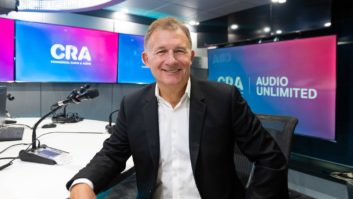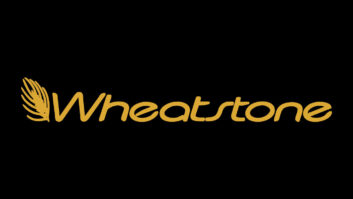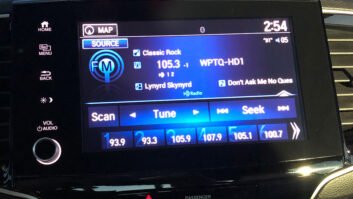
Kelly Orchard I discovered “social networking” in the mid-’90s, when AOL first became popular and we were all using dial-up connections and getting into “chat rooms.” My initial impression of radio back then was pure joy, because I could put out my message and get an immediate response — like those chat rooms. It was fun!
What surprises me now is that radio hasn’t engaged in advancing forms of social media more than it has, and that broadcasters often treat this evolving playing field as a nuisance or something they’d “better adapt to or get left behind.”
Radio was the first “social media” — a pioneering way of communication. Radio introduced the idea of transmitting a message to the masses first, taking live calls and engaging with the audience. Look at Ham radio.
Over frequencies, we had the very first “social medium.” So how did radio become so insecure about its position in the community?
I’m a second-generation broadcaster. My dad was an engineer in Los Angeles during radio’s reinvention period in the 1960s. While critics claimed that television programming was going to be the death of radio, my father and his colleagues didn’t care. They were inventing, engaging, creating and having a ball.
There is a group on Facebook, nearly 2,000 members strong, called “Old Radio DJs,” which comes together and shares pictures and stories of the glory years on the air — and it has not only become very nostalgic, but has caused me to observe a population of collective individuals who loved the industry and what they were able to do, which was inform and entertain.
When I hear people say, “Yeah, but radio isn’t like that anymore; the bean counters have taken over,” or, “Social media and digital has killed radio,” I cringe. Why? Because it sounds so familiar.
Has radio given up? Is radio dead?
THE DOCTOR IS IN
I’ve been working as an FCC Compliance Consultant since 2000. Orchard Media Services specializes in FCC compliance plans, public files, “mock” inspections, etc. It’s a business partnership with my dad, and I’ve had the honor of visiting hundreds of radio and television stations all over the country for more than 13 years.
Prior to that, I sold time for radio in Sacramento. Before that, my family built, owned and operated several stations in Southern California, including my namesake, KLLY(FM) — “Kelly 95” — in Bakersfield, Calif. I’m no rookie; I’ve seen it all.
A few years ago, I decided to pursue a master’s degree in psychology, and have been working as a therapist since, maintaining Orchard Media Services from the sidelines, hoping that the economy would turn around, or that radio would figure out what it’s going to do. I followed the trades, maintained relationships within the industry, and even graduated from the NABEF’s Broadcast Leadership Training program.
As I continue to consult with stations about their FCC Compliance plans, I can’t help but notice an atmosphere of stress, anxiety and general frustration and discouragement at the state of the industry. So now I am on a mission to provide peace of mind, mental wellbeing and help to my friends in the industry. I’m a media and mental health advocate.
MENTAL HEALTH, WELLNESS AND RADIO
Admitting that one has symptoms of depression, anxiety and stress doesn’t come easy, especially in the work environment. If it’s not a matter of life-and-death, nobody wants to talk about it. Yet given the statistics, one in four people suffers from depression, stress and anxiety, and believe me: it’s affecting the bottom line. But if one in four workers is struggling, that also means that your radio audience is suffering, too.
I have a few theories that I’ve borrowed from psychology, and if you as a reader will indulge me, we can explore the dysfunctional relationship between radio and the audience— while also understanding the dysfunction within the station and how it affects the overall operations.
I had this idea that if we looked at “Radio” as if it was an individual and not an industry, and similarly considered “Audience” as if it was an individual and not just a collection of ears — and if we considered the relationship of “Radio” and “Audience” as if they needed marriage counseling to heal their “dysfunctional relationship” — we might gain a new perspective on what has happened to this union.
If Radio and Audience participated in a kind of marriage counseling, here are a few things that the therapist would take into consideration:
• Radio’s Personality Traits
• Audience’s Personality Traits
Now, it might seem to Radio as if Audience has already disengaged in the relationship. Is it a possibility that Radio is trying too hard, and therefore comes off as insecure and needy? Or has Radio not tried hard enough to maintain Audience’s love? If this was an actual couple that was looking at their relationship, the answer is quite possibly … both.
Audience seems to suffer from Attention Deficit Disorder. It can’t seem to stay focused on one subject. Listeners are scattered and jumpy, and any shiny new object distracts them.
Now Radio, on the other hand, might be suffering with a little bit of Narcissistic Personality Disorder, with its grandiose sense of self, need for admiration and lack of empathy; all underlying symptoms of deep-seated insecurity.
Of course, who wouldn’t be insecure in this economic climate? Consider the economy and its impact on the Audience. That is an entirely different (although complementary) topic from what’s going on within a station’s walls.
The media landscape is constantly changing, and very unpredictable.
Radio keeps chasing Audience with shallow attempts to get its attention — cosmetic changes akin to getting exercise, losing weight, dressing nicer (redesigning a website, more musical programming) — but Audience doesn’t care about the surface stuff. Radio needs a shift in perspective. Stop chasing Audience with pretty clothes and new perfume.
WHAT DOES THE AUDIENCE WANT?
That is the big question. Has Radio actually asked Audience what they want out of the relationship? Review the above statistics — one in four people is suffering from depression, stress and anxiety. Audience might be looking at other relationships to relieve these symptoms.
Radio seems to be telling Audience, “Well, this is how it is, and by the way, here are some free tickets.”
How will Radio know what Audience wants? Ask. Surveys about customer satisfaction and inquiries on how companies can improve their product offerings are readily available, but since deregulation of specific licensing requirements, stations don’t perform community ascertainments the way they used to. Ascertaining the comments and concerns from the community has always been a great tool to uncover what the community actually needed.
MARRIAGE COUNSELING 101
Questions that a therapist would tell Radio to think about when considering its relationship with Audience:
1. How much does Radio know about Audience on a personal level? Aside from the “research,” what do they really want?
2. How much does Radio identify with Audience? Are you, as a relationship, compatible?
3. What worked in the past? How did Audience first fall in love with Radio and what has changed?
4. How much does Radio really care about Audience (besides some numbers and time spent listening)?
5. To what degree does Radio and Audience feel like a family?
6. Is it really more music, less commercials? In a marriage counseling context – is it really about the quantity of the “dates” and what you can “do” for your partner? Be realistic. Audience can get that anywhere — so what Radio can do is create a community unlike any other medium.
Free stuff, contests, concerts and events are all fine; it’s like dating. But when it comes down to one single concept,Audience wants an intimate relationship. Companionship. Somebody they feel comfortable with that won’t abandon them.
Music and talk are, well, just music and talk. Radio needs to develop an actual relationship with audience. The format is the vehicle, but where is the emotional connection?
Over the past few months, I’ve spoken with plenty of leaders in the industry about this concept. I’ve spoken with leaders from the NAB, state associations, lawyers, consultants, brokers, operators and staff, all of whom have responded with, “You’re onto something here.”
BAND OF GOLD
So, I offer some questions that a therapist would tell Radio to think about when considering counseling with Audience. They are shown in the box on this page.
What can radio do next? Maybe the answer is to stop chasing Audience. Do whatever it takes to get Audience to fall in love with Radio again. One way or the other, something needs to change. And this is where the work begins: Within the walls of each and every Radio station. Start there.
There are evidenced based practices in mental health and therapy that have proven to heal relationships. Positive thinking is an approach that works. Consider the laws of physics. Broadcast engineers will definitely love this, and so will sales managers: Whatever you put out will come back to you; for every action, there is an equal but opposite reaction.
Consider your mindset as you go to work. If you are thinking negatively, hate your job, hate the business — the audience will pick up on that. So take the time to consider what your thoughts might be doing, and then experiment with changing them.
I know its easier for me to say this than it is to actually do it, but as a therapist, I’ve helped many people consider the alternative if they do nothing, and have watched them succeed when they begin by simply allowing themselves to shift the way they think into a positive frame of mind.
Kelly Orchard is managing partner of Orchard Media Services and founder/CEO of Red Slipper Integrative Coaching, a personal and professional development consulting firm. She speaks to radio groups about mental health and how it affects the organizational environment. Email: [email protected].












